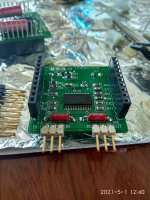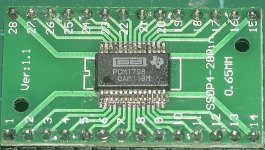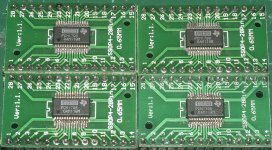Photo, pins are slightly off the pads but within QA tolerances. I always aim for best practice.Well flux me, Nigel's tip worked. A liberal application of flux was what it needed, all the excess came off onto the copper wick, a real eureka moment.
Thanks Nigel.
You probably want to check for shorts between pins with an ohmmeter, some pins at the bottom row look shorted.
Jan
I use a powerful magnifying glass as sometimes pins are too close for probes.
Sometimes excess flux needs cleaning off to see properly.
I tried again today, using the paste onto the pins not the pads and a hand iron. Sadly one side is out of line with the pads, so might not work.
I'm just hoping two out of the four work okay, I will go over them pin by pin with the multimeter.
I'm just hoping two out of the four work okay, I will go over them pin by pin with the multimeter.
Attachments
I have a couple of ancient but still very useful pots of Fluxite.
Fluxite - that's for plumbing, isn't it, at least mine is. The flux is acidic, not wise for pcb assembly.
Fluxite may be a brand-range as well as a specific product. But the classic Fluxite is clearly an acid based "Plumber's" flux. If you brought it through the gate at RCA Computers in the 1960s you would be fired on the spot. It eats wires (pipes not so much).
This Fluxite is in a green tin, is made in England and has a price sticker on it in Shillings and Pence, so it's likely from the 1960s.
There are special tips,made for this method. They have a concave area at the tip to hold a pool of solder.I took a very good smd soldering course way back and that is what we used,they work very well.Make sure and use flux,always.
Yes, the tip is the secret sauce (plus the flux). With a standard tip it doesn't work. The concave "hole" in the bevel tip allows to add and remove solder at will in seconds. It's so easy it feels like cheating.
I recommend KSGER soldering iron from aliexpress, with BCM2/BCM3 tip.
Last edited:
Yep, that's exactly mine too. Fry's Fluxite. Bought it in 1972, and still in use, but never for PCB work.This Fluxite is in a green tin, is made in England and has a price sticker on it in Shillings and Pence, so it's likely from the 1960s.
Well it works great for PCB work, and you clean the excess off afterwards, so what's the problem?
I'm about sick of this forum, trying to get help and advice is like getting blood from a stone but there are plenty of people just dying to point out any tiny little thing you might not be doing just right.
I'm about sick of this forum, trying to get help and advice is like getting blood from a stone but there are plenty of people just dying to point out any tiny little thing you might not be doing just right.
I'm about sick of this forum, trying to get help and advice is like getting blood from a stone but there are plenty of people just dying to point out any tiny little thing you might not be doing just right.
Yeah +1 the nitpickers are annoying.
That doesn't change the fact zinc chloride flux will destroy your board if not thoroughly cleaned.
Yeah, I don't use the Fluxite often and always clean any residue off with isopropyl.
I'll give you an example of the imbalance between negativity and helpfulness - at least 5 times in the last couple of weeks people have chimed in to tell me the 7805 shouldn't be used in audio in 2021. However, not one of them, when asked, has a single word to say about what I should use INSTEAD of the 7805.
This is not helpful.
I'll give you an example of the imbalance between negativity and helpfulness - at least 5 times in the last couple of weeks people have chimed in to tell me the 7805 shouldn't be used in audio in 2021. However, not one of them, when asked, has a single word to say about what I should use INSTEAD of the 7805.
This is not helpful.
at least 5 times in the last couple of weeks people have chimed in to tell me the 7805 shouldn't be used in audio in 2021.
rofl
7805 isn't special snowflake enough, too cheap, not anointed...
Modern LDOs have much lower dropout and lower idle current, but PSRR, noise and especially transient response are not necessarily better (and often worse) than the old fossil 7805... unless you pick a really good one... there is no incentive to develop a cheap mass produced high performance regulator because everyone uses switchers anyway.
> However, not one of them, when asked, has a single word to say about what I should use INSTEAD of the 7805.
For giggles, ask for "measurements to back it up" , this never fails.
I just went ahead and built the supply I needed with a 7805.
I spent a lot of time trying to learn about 'better' regulators and just never got any clear guidance from anything I read.
I spent a lot of time trying to learn about 'better' regulators and just never got any clear guidance from anything I read.
- Home
- Design & Build
- Construction Tips
- First attempt at reflow soldering


